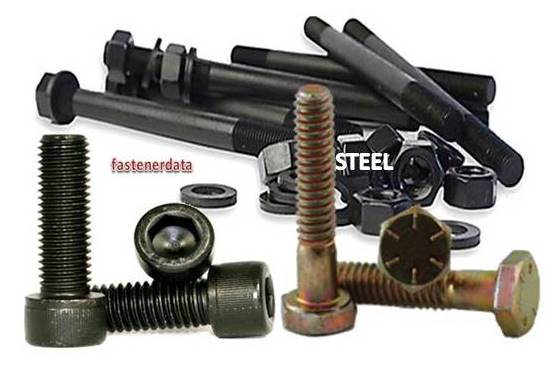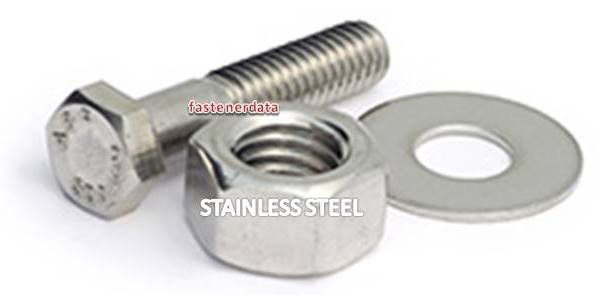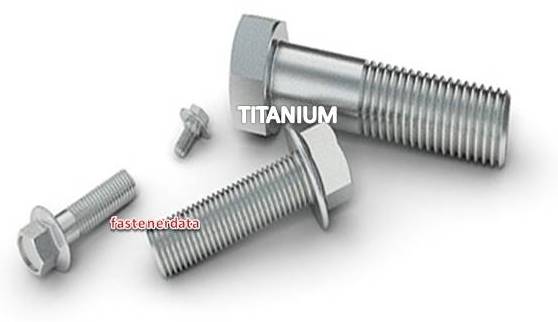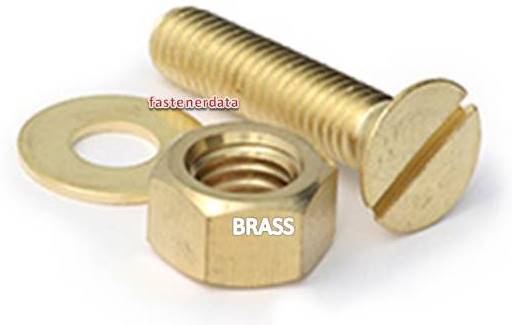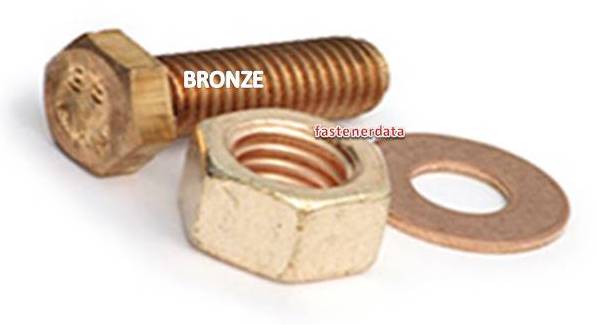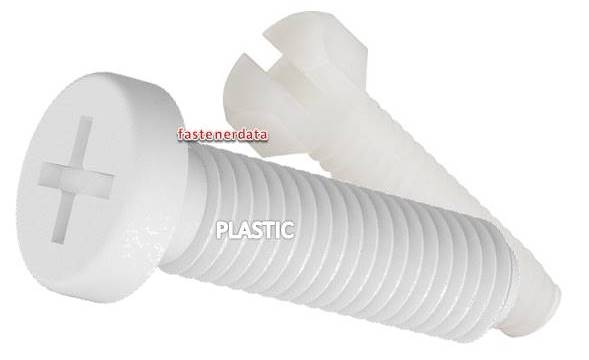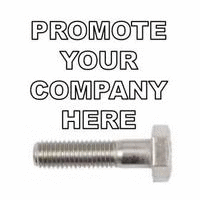FASTENER MATERIAL
Fastener materials are important when selecting a threaded fastener due to differences in strength, brittleness, corrosion resistance, galvanic corrosion properties and cost of the available materials.
When replacing fasteners, it is generally best to match what you are replacing. Substituting a bolt with a stronger one is not always safe. Harder bolts are more brittle and may fail in specific applications; some equipment is designed so that the screws will fail before more expensive or critical items are damaged. In some environments, for example, ‘salt water’ galvanic corrosion must also be considered if changing fastener materials.
Link Galvanic corrosion Link Thread Galling
Links
CARBON STEEL ALLOY STEEL STAINLESS STEEL
TITANIUM BRASS BRONZE ALUMINIUM PLASTIC
Carbon steel fasteners
Many types of different material are used to manufacture fasteners, the greatest volumes are made from carbon and alloy steels. Steel can provide a combination of strength at a reasonable cost, and many steels can be pressure formed by both low and high production methods.
The variety of steel compositions gives a range of strengths. Low carbon steel is the lower cost material and these give the lowest strength fastener. Increase the amount of carbon and the strength increases.
Low Carbon Steels/Mild Steels contain up to 0.3% carbon
Medium Carbon Steels contain 0.3 – 0.6% carbon
High Carbon Steels contain more than 0.6% carbon.
Carbon steel fasteners can be hardened by heat treatment with the Carbon content being proportional to the increased strength by heat treatment.
Another factor is the level and types of impurities such as Sulphur added to the steel to improve performance when machined or welded. Elements such as manganese, phosphorus and sulphur are found in all grades of steel; manganese provides beneficial effects but phosphorus and sulphur are detrimental to steel's strength and durability.
Alloy Steel Bolts and Nuts
Alloying elements Manganese, Nickel, Chromium, Silicon, Titanium, Aluminium, Molybdenum, Vanadium and Copper can be added to steel to manipulate the steel's properties. The proportions of these elements will determine the properties of each alloy steel grade. When materials Molybdenum, Vanadium, Chromium or Nickel are added they create high strength steels and improve toughness; there is a high cost in adding these elements to the steel mix.
Along with Carbon and Alloy steel, there are Carbon-Boron steels. Small amounts of boron allow steels to be heat treated to high strengths without the cost penalty of other alloying elements, in many parts of the world there is widespread use of Boron steels for fasteners though there is some resistance in the USA. The properties of carbon-boron steels are not as good as alloy steels but they give a reasonable compromise between cost and improved properties benefits.
Stainless Steel Fasteners
With the addition of alloying elements to low Carbon steel such as Chromium and Nickel in high amounts, Carbon steel develops a resistance to corrosion or staining, and will not lose this resistance if scratched; it is then known as Stainless steel. With over 11% chromium, Stainless steel is about 200 times more resistant to corrosion than mild steel the alloying elements are a lot more expensive than normal carbon steel. In common fastener stainless steel grades, nickel can account for up 20% by weight but this can represent more than half of the value. Nickel prices fluctuate and this there could be a cost penalty for using stainless steel fasteners.
A2 18-8 304 Fasteners
Austenitic stainless steels are non-magnetic and non-heat-treatable, and generally contain 18% chromium, 8% nickel and less than 0.8% carbon and form the largest portion of the global stainless steel fastener market being used in food processing and areas subject to the corrosion effects of clean water.
A4 316 Fasteners
A highly corrosion-resistant grade of stainless steel is Ideal in salt water but not chlorine environments and is generally referred to as marine grade.
The fastener Gas and Oil industries also use other stainless steels
Ferritic Steel Fasteners
Ferritic steels contain trace amounts of nickel, 12-17% chromium, less than 0.1% carbon, along with other alloying elements, such as Molybdenum, Aluminium or Titanium. These magnetic steels cannot be heat hardened but can be strengthened by cold working.
Martensitic Steel Fasteners
Martensitic steels contain 11-17% chromium, less than 0.4% nickel and up to 1.2% carbon. These are magnetic and heat-treatable steels.
It is a popular misconception that stainless steels are stronger than alloy steels; this is incorrect, because of their low carbon content, many stainless steel alloys cannot be hardened through heat treatment whereas many regular and alloy steel can. The stainless alloys used in bolts are stronger than un-hardened steel but significantly weaker than hardened steel and alloy fasteners.
Higher strength grades of A2-70 and A4-80 are available
Link Thread Galling
Titanium alloy Fasteners
Titanium alloys have the property of high strength to weight ratios at strength levels comparable with alloy steels; they are increasingly used in aircraft and vehicle racing applications. Titanium is corrosion resistant so they also have marine and saltwater applications. The extremely high cost of this material prevents its wider use.
Brass Bolts Nuts Washers and Screws
Brass is an alloy of copper and zinc, and has a high corrosion resistance in some environments but may tarnish under certain atmospheric conditions. Brass fasteners have a limited use due to its relative softness; they are extensively used in electric products because they are electrically conductive. They are also used in areas of appearance particularly home furnishings and marine applications where a decorative appearance is required.
Bronze Fastenings
Bronze is another copper-based alloy but usually more expensive than brass. It has higher strength and greater corrosion resistance and is preferred over stainless and brass in more critical marine applications. There are many different types of bronze formulations the most popular is Silicon bronze which is an alloy made mostly of copper and tin with a small amount of silicon. Bronze is similar to copper in colour and is also sometimes seen in fine woodworking tool fasteners where it is used for its appearance. The main disadvantage of bronze is its high cost.
Aluminium Screws
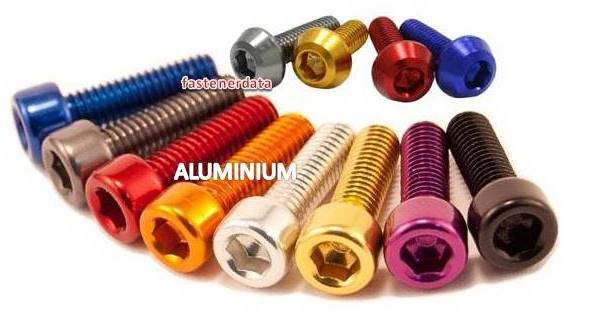
Aluminium is a light, soft, corrosion-resistant metal, aluminium’s corrosion resistance is inherent to the material accordingly, scratching will not affect the corrosion resistance. Aluminium alloy fasteners are used in the aluminium window industry and also for decorative appearance. They have a natural matt silver-grey colour, but an anodising surface treatment can be applied to give increased resistance to atmospheric corrosion and also a decorative colour finish. High strength aluminium fasteners are made from a variety of aluminium alloys, with elements such as Manganese, Silicon, Iron, Magnesium, Zinc, and copper being added to increase strength and melting point. Aluminium fasteners are sometimes specified in automobile applications where light component construction is required and extensively in Rivet production.
Plastic Fastenings
Plastics Fasteners are manufactured from various plastic compounds the most popular nylon 6/6 have low strength characteristics but are quite suitable for applications where lightness or electrical non-conductivity is important. Various plastic materials are used to give a wide variety of properties. The more commonly used grades are nylon, polycarbonate and high-density polyethylene. Nylon is also used as an insert into nylon insert nuts and other internally threaded fasteners to give a locking feature.

